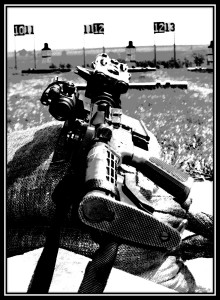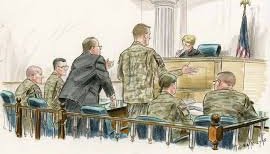These are difficult times to be a Military leader. The Zero-Defects mentality has returned; the Armed Services suffer under a withering barrage of charges leveled by crusading politicians making hay at the Military’s expense over intractable problems like rape and sexual assault; domestic violence; fraud, waste, and abuse; suicide; and whatever other issue has grabbed the headlines. Budget cuts and force structure reductions create pressure on the services to reduce manpower. In this environment, complaints and allegations are rife; investigations proliferate; and honorable men and women find their careers and reputations under attack. In the prevailing culture, every officer and NCO can expect to be the target or subject of an investigation at some point, whether it be a criminal investigation into allegations of violating the Uniform Code of Military Justice (UCMJ), a 15-6 or other administrative command investigation, or an investigation by the Inspector General (IG). No matter what kind of investigation it is, the investigation, and your response to it, can have a ruinous effect on your life and career if you don’t handle it right – so what do you do? The following are some of the things you should do immediately.
Do:
Retain Counsel and Remain Silent Until You Do. When you find out you are under investigation, your first impulse may be to talk to the investigator or your chain of command and sort it out all out. DON’T DO IT until you have consulted with counsel. Anything you say can be used against you. You need to carefully consider whether to speak to the investigator, and if so, what to say.
Retain Counsel and Take the Initiative. Government-appointed military defense counsel have very few resources at their disposal and will usually advise their clients to await the outcome of the investigation and then try to rebut findings. This can be disastrous: First, it forfeits any opportunity to shape the outcome of the investigation in a favorable way; second, it squanders valuable time that could have been employed crafting an effective rebuttal before the investigation is complete; third, it cedes the initiative and control to the investigator.
Retain Your Own Investigator: If you are facing criminal charges or even a serious command or IG investigation, you and your Attorney should consider retaining your own investigator to develop exculpatory evidence; to gather evidence that your counsel can use to discredit or impeach the Government’s evidence; and, potentially, to serve as a friendly witness at any Court Martial or administrative hearing.
Consider Retaining a Polygraph Examiner: While not generally admissible in civil courts, a favorable polygraph examination can strongly influence the final outcome of any military investigation – and if the Polygraph Examiner was retained by your attorney, everything you tell, as well as the results of the test itself, are protected by attorney – client privilege.
Vigorously Rebut the Investigator’s Findings: Many military investigations are conducted by untrained personnel without any investigatory experience, and the result is often a poorly conducted investigation and poorly reasoned and poorly supported findings and recommendations. An effective rebuttal can often lay these shortcomings bare and discredit the investigation.
Our law firm has client meeting locations in Virginia and Maryland. If you are under military investigation in Virginia or Maryland, do not hesitate to contact the SRIS Law Group, P.C. Our attorneys who assist clients with military investigations will do their best to help you.
Do NOT:
Don’t Apologize or Accept Responsibility Where You are Not at Fault: Military personnel under investigation are often betrayed by their own integrity and character. As Service Members, we are taught not to make excuses, and to accept responsibility not only for our own actions but for those our organization as well. In responding to charges or allegations, many Service Members will offer apologies or accept some degree of blame where none is warranted, only to have their statement used against them. Do not accept any responsibility or blame that you don’t deserve, and even if you think you do deserve it, don’t say anything without the advice of your Attorney. Even if you think you are at fault, be quiet, till you hire your own attorney. Let your lawyer do the talking for you.
Don’t Assume the Investigator is Unbiased: Investigators often reach conclusions long before they have completed their investigations. By the time they interview you, they may merely be looking for evidence to corroborate the conclusions they have already reached.
Don’t Wait Passively for the Outcome: The investigator and your chain of command will rapidly become psychologically and emotionally invested in the investigator’s findings. They longer it takes you to offer an effective rebuttal, the more mentally entrenched the other side will be. It is critical that you be prepared to rebut the findings immediately, and this requires aggressive preparation before the investigation is complete.
Don’t Take a Government Polygraph Without Consulting Your Attorney: While having your Attorney retain your own Polygraph Examiner can produce invaluable results, consenting to a Government Polygraph can be disastrous for multiple reasons. The test results and everything you tell the Examiner will be given to the Government. If the Polygraph Examiner finds you to have been deceptive, the investigator will likely be irretrievably invested in his belief in your guilt. Also, a Polygraph Examination includes an extensive pre-test interview where the examiner may ask you compromising questions – and if you answer them, the Government may be able to use your answers against you somehow. If the Government asks you to take a Polygraph Examination, you must discuss this with your Attorney and submit to it only after careful consideration. Even when a Polygraph Examination might be helpful, it is often a better choice is to retain your own Polygraph Examiner and provide the results of that exam to the Government.
Conclusion: Are you under military investigation in Virginia or Maryland? If so, contact the SRIS Law Group, PC, for a free consultation immediately. We are as committed to defending your rights and vindicating your honor as you are to defending our great Republic. Call us today.
Our law firm has client meeting locations in Virginia and Maryland. If you are under military investigation in Virginia or Maryland, do not hesitate to contact the SRIS Law Group, P.C. Our attorneys who assist clients with military investigations will do their best to help you.
 At last 60 Minutes presented its long-awaited segment on the Army National Guard G-RAP program, and the Army’s investigation into it. There was a lot wrong with G-RAP. Some Soldiers abused the program and deserve punishment. But it is also true that a number of innocent Soldiers have been swept up and unfairly targeted for investigation related to G-RAP. This was dramatically demonstrated in the case of the two Soldiers profiled here who were prosecuted under the G-RAP investigation and AQUITTED OUTRIGHT – but that isn’t good enough for the Army, which went on to impose career-ruining administrative sanctions upon them. LTG Cheek defends this by saying that just because you’re found not guilty of a crime doesn’t mean you aren’t unethical. To me, that sounds a lot like saying “just because you’re not guilty, doesn’t mean you’re not guilty.” SHAME!
At last 60 Minutes presented its long-awaited segment on the Army National Guard G-RAP program, and the Army’s investigation into it. There was a lot wrong with G-RAP. Some Soldiers abused the program and deserve punishment. But it is also true that a number of innocent Soldiers have been swept up and unfairly targeted for investigation related to G-RAP. This was dramatically demonstrated in the case of the two Soldiers profiled here who were prosecuted under the G-RAP investigation and AQUITTED OUTRIGHT – but that isn’t good enough for the Army, which went on to impose career-ruining administrative sanctions upon them. LTG Cheek defends this by saying that just because you’re found not guilty of a crime doesn’t mean you aren’t unethical. To me, that sounds a lot like saying “just because you’re not guilty, doesn’t mean you’re not guilty.” SHAME! At last 60 Minutes presented its long-awaited segment on the Army National Guard G-RAP program, and the Army’s investigation into it. There was a lot wrong with G-RAP. Some Soldiers abused the program and deserve punishment. But it is also true that a number of innocent Soldiers have been swept up and unfairly targeted for investigation related to G-RAP. This was dramatically demonstrated in the case of the two Soldiers profiled here who were prosecuted under the G-RAP investigation and AQUITTED OUTRIGHT – but that isn’t good enough for the Army, which went on to impose career-ruining administrative sanctions upon them. LTG Cheek defends this by saying that just because you’re found not guilty of a crime doesn’t mean you aren’t unethical. To me, that sounds a lot like saying “just because you’re not guilty, doesn’t mean you’re not guilty.” SHAME!
At last 60 Minutes presented its long-awaited segment on the Army National Guard G-RAP program, and the Army’s investigation into it. There was a lot wrong with G-RAP. Some Soldiers abused the program and deserve punishment. But it is also true that a number of innocent Soldiers have been swept up and unfairly targeted for investigation related to G-RAP. This was dramatically demonstrated in the case of the two Soldiers profiled here who were prosecuted under the G-RAP investigation and AQUITTED OUTRIGHT – but that isn’t good enough for the Army, which went on to impose career-ruining administrative sanctions upon them. LTG Cheek defends this by saying that just because you’re found not guilty of a crime doesn’t mean you aren’t unethical. To me, that sounds a lot like saying “just because you’re not guilty, doesn’t mean you’re not guilty.” SHAME!



